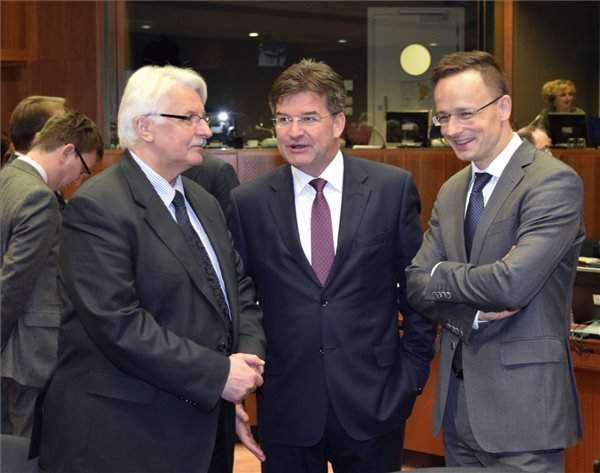Meeting of European Union foreign ministers – Szijjártó urges speeding up European integration of Eastern Partnership countries

Brussels, May 23 (MTI) – The European integration of the Eastern Partnership countries must be speeded up both for the sake of stability in those countries and Europe’s security, Hungary’s foreign minister said on Monday.
Speaking on the sidelines of a meeting of European Union foreign ministers, Péter Szijjártó said the security situation in the EU’s eastern neighbouring regions is extremely “fragile”. Out of the Eastern Partnership states, Moldova, Ukraine, Georgia, Azerbaijan and Armenia are all involved in disputes that directly affect Europe’s security.

The countries involved are in need of positive feedback from the EU, because without it support for the governments in favour of integration in those countries will decrease dramatically, Szijjártó said.
He called on the EU to grant visa-free status to Georgia and Ukraine with immediate effect, given that those countries have both fulfilled all criteria for receiving it.
The minister said Hungary recommended signing a strategic partnership agreement with Azerbaijan as soon as possible, as it is the EU’s only source for energy diversity in the short run.
Hungary also recommended opening up EU funds for Belarus, arguing that trade relations with it are expected to be “especially beneficial” for the EU.
Szijjártó: EU foreign ministers adopt all of Hungary’s proposals at meeting
A closing statement adopted at a meeting of the European Union’s foreign ministers on Monday included every proposal put forward by Hungary, Szijjártó said.
The bloc’s top diplomats were in Brussels to discuss resolving Europe’s drawn-out migration crisis.
Hungary’s proposals included the ten-point “Schengen 2.0” action plan put forward by Prime Minister Viktor Orbán last month. The meeting’s closing statement says the Foreign Affairs Council will look further into the prime minister’s plan which aims to strengthen Europe’s security by protecting the Schengen system.
The ministers also approved the plan to examine the possibility of setting up hotspots for registering migrants outside the EU’s borders so that it can be determined whether a migrant is eligible for refugee status before they enter the bloc’s territory. This is especially important seeing as how the readmission agreement between the EU and Turkey has not been effective enough, Szijjártó said.
Szijjártó said the move to set up hotspots outside the EU would also help save tens of thousands of lives, because the system could convince other potential migrants not to attempt the journey to Europe. It could also destroy the business model of people smugglers, he added.
The closing statement also touches on border protection and providing financial aid to Turkey, Jordan, Lebanon and the Kurdish region of Iraq where hundreds of thousands of refugees are being tended to, Szijjártó said.
The ministers agreed that the migrant pressure on Europe was likely to increase in the long run, as there are 30 million-35 million people living in Europe’s neighbouring regions, who, given their living conditions, could decide to set off for Europe at any time.
Photo: MTI
Source: http://mtva.hu/hu/hungary-matters





